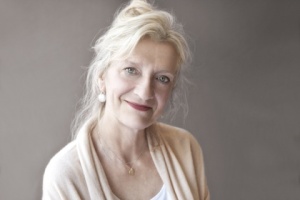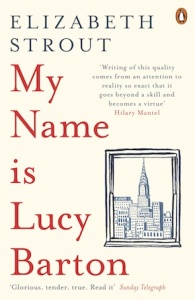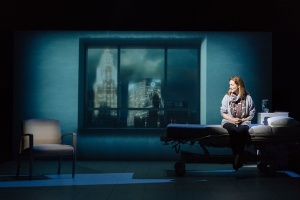The starving father-man
by Elizabeth StroutIn the Metropolitan Museum of Art, which sits so large and many-stepped on Fifth Avenue in New York, there is a section on the first floor referred to as the sculpture garden, and I must have walked past this particular sculpture1 many times with my husband, and with the children as they got older, me thinking only of getting food for the kids, and never really knowing what a person did in a museum of this nature where there were so many things to look at. In the middle of these needs and worries is a statue. And only recently – in the last few years – when the light was hitting it with a splendid wash, did I stop and look at it and say: Oh.
It is a marble statue of a man with his children near him, and the man has such desperation on his face and the children at his feet appear to be clinging, begging him, while he gazes out toward the world with a tortured look, his hands pulling at his mouth, but his children look only at him, and when I finally saw this, I said inside myself, Oh.
I read the placard, which let me know that these children are offering themselves as food for their father, he is being starved to death in prison, and these children only want one thing – to have their father’s distress disappear. They will allow him – oh, happily, happily – to eat them.
And I thought, So that guy knew. Meaning the sculptor. He knew.
And so did the poet who wrote what the sculpture has shown. He knew too.
A few times I made a trip to the museum specifically to see my starving father-man with his children, one grabbing at his leg, and when I got there I didn’t know what to do. He was as I had remembered him, and so I stood at a loss. Later I realized I got what I needed when there was a furtiveness to my seeing him, such as if I was in a hurry to meet someone elsewhere, or if I was with someone in the museum and I’d say I needed to use the bathroom, just to get away and see this on my own. But not on my own the same way as when I made the trip entirely alone to see this frightened starving father-man. And he is always there, except for once when he was not. The guard said he was upstairs in a special exhibit and I felt insulted by the whole thing, that others wanted to see him that much!
Pity us.
I thought those words later, as I thought of my response when the guard told me the statue was upstairs. I thought, Pity us. We don’t mean to be so small. Pity us – it goes through my head a lot – Pity us all.
From My Name is Lucy Barton (Penguin Books, £8.99) © 2016 Elizabeth Strout
1 Ugolino and His Sons by Jean-Baptiste Carpeaux at the Metropolitan Museum of Art
 Elizabeth Strout is the Pulitzer prize-winning author of Olive Kitteridge, as well as The Burgess Boys, Abide With Me and Amy and Isabelle She has also been a finalist for the PEN/Faulkner Award and the Orange Prize. My Name is Lucy Barton, longlisted for the 2016 Man Booker Prize and the Bailey’s Women’s Prize for Fiction, the follow-up story collection Anything is Possible, shortlisted for the 2018 Rathbones Folio Prize, are published by Penguin. She lives in New York City and Portland, Maine.
Elizabeth Strout is the Pulitzer prize-winning author of Olive Kitteridge, as well as The Burgess Boys, Abide With Me and Amy and Isabelle She has also been a finalist for the PEN/Faulkner Award and the Orange Prize. My Name is Lucy Barton, longlisted for the 2016 Man Booker Prize and the Bailey’s Women’s Prize for Fiction, the follow-up story collection Anything is Possible, shortlisted for the 2018 Rathbones Folio Prize, are published by Penguin. She lives in New York City and Portland, Maine.
Read more
elizabethstrout.com
@LizStrout
Author portrait © Leonard Cendamo
The stage adaptation of My Name is Lucy Barton by Rona Munro, a mesmerising 90-minute monologue performed by Laura Linney, ran at London’s Bridge Theatre in June 2018, directed by Richard Eyre.
More info



